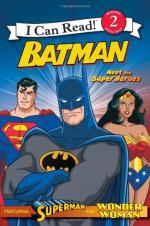|
This section contains 358 words (approx. 2 pages at 300 words per page) |

|
[By 1942, the critics were in action, pro and con, regarding Superman.] Superman was the ideal outlet for youth's unruly instincts; Superman was in the tradition of the American hero; Superman was a force for good in a world of evil. Or: Superman expressed an irresponsible social philosophy in which the average citizen abjured his own duties and let the marvel fulfill them; Superman was a glorification of the physical; Superman represented absolute power, which is ultimately corrupting. While the battle raged, kids bought the comic books, listened to the radio programs, heeded Superman's preferences in literature, clothing, bubble gum and toys.
He seems a little easier to explain now, twenty years later. The thirties were a period of trial, and many of us had lost our old faith in the traditional virtues. The gangster was an American institution, a salient figure in fact and fiction. War was imminent...
|
This section contains 358 words (approx. 2 pages at 300 words per page) |

|


